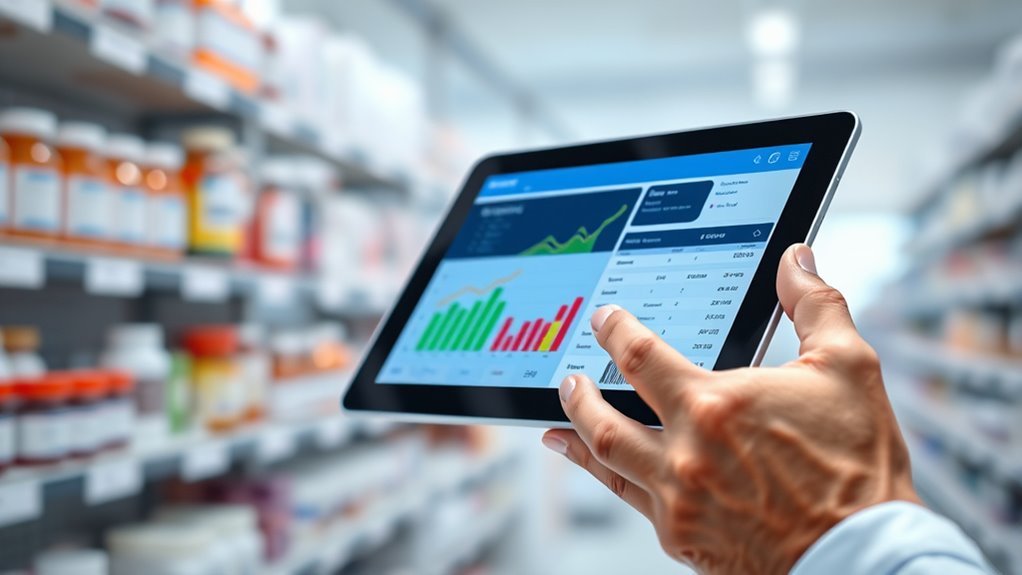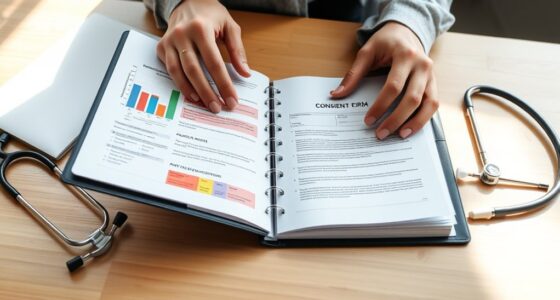To track your prescription information effectively, keep detailed records including drug names, dosages, prescribing doctors, pharmacy details, and refill dates. Use digital apps, notebooks, or online portals to update and review your medication history regularly. Verify labels, communicate with pharmacists, and confirm insurance and contact details. Mark refill schedules and stay proactive to avoid shortages. Staying organized and maintaining good communication with your pharmacy helps ensure your medication safety—learn more about mastering your prescription management.
Key Takeaways
- Record detailed prescription information, including drug name, dosage, prescribing doctor, pharmacy, and refill dates.
- Use digital apps or notebooks to maintain and update medication records regularly.
- Verify medication labels against prescribed instructions and clarify discrepancies with your pharmacy.
- Mark refill dates on calendars and confirm contact and insurance details with your pharmacy beforehand.
- Communicate proactively with pharmacy staff to ensure medication safety and address any concerns promptly.

Have you ever wondered how effectively your prescriptions are being managed? Making sure that your medication information is accurate and up-to-date is vital for your safety and well-being. When you track your prescription information carefully, you play a key role in maintaining medication safety. It starts with understanding how your pharmacy communicates with you and your healthcare providers. Clear, consistent pharmacy communication helps prevent errors, such as incorrect dosages or drug interactions. By actively managing your prescription details, you can catch discrepancies early, reducing the risk of adverse effects.
Managing your prescriptions carefully enhances safety and helps prevent medication errors.
One effective way to track your prescription information is to keep a detailed record of all your medications. This should include the drug name, dosage, prescribing doctor, pharmacy name, and refill dates. Having this information readily available helps you verify that what you’re taking matches what your healthcare providers ordered. When you’re aware of your medication schedule, you’re better equipped to notice any changes or inconsistencies, which can be vital in avoiding medication errors. Use a dedicated app, a notebook, or digital tools that allow you to update your prescription list regularly. This way, you can quickly reference your medication history during doctor visits or pharmacy pickups.
Regularly checking your medication bottles and labels is also essential. Make sure the labels match your prescribed instructions, and note any differences or errors. If you notice anything suspicious or unclear, don’t hesitate to contact your pharmacy for clarification. Effective pharmacy communication isn’t just about receiving instructions; it’s an ongoing dialogue. Establish a good rapport with your pharmacist, so you feel comfortable asking questions or reporting concerns. Many pharmacies now offer online portals where you can view your prescription history, refill status, and medication instructions. Utilizing these resources keeps you informed and minimizes misunderstandings.
Another vital step in tracking prescription information is staying organized with refill schedules. Mark your calendar with upcoming refill dates and verify that the pharmacy has your current insurance information and contact details. This proactive approach guarantees you don’t run out of essential medications unexpectedly. When you communicate with your pharmacy, confirm your prescription details and ask about any potential drug interactions, especially if you’re starting new medications. Keeping an open line of communication helps safeguard medication safety and ensures your treatment plan remains clear.
Frequently Asked Questions
Can I Access Prescription Info From Multiple Pharmacies?
You can access prescription info from multiple pharmacies through pharmacy coordination and medication history tools. Many pharmacies share data via electronic health records or third-party apps, allowing you to view your prescriptions across providers. By linking your pharmacy accounts or using a medication management app, you get a thorough view of your medication history, ensuring better coordination and avoiding double prescriptions. Always check with your pharmacies to see if they participate in such systems.
How Often Should I Update My Prescription Records?
Picture perfect prescription practices promote proper medication adherence. You should update your prescription records promptly whenever you get a new refill, experience a dosage change, or switch pharmacies. Regular updates help assure refill reminders are accurate, preventing missed doses or medication mix-ups. By staying vigilant and vigilant, you’ll safeguard your health, streamline your medication management, and stay on top of your prescriptions, making your health journey smooth and stress-free.
Is Prescription Tracking Available for Over-The-Counter Medications?
Prescription tracking is mainly designed for prescription medications, not over-the-counter drugs. For OTC meds, you can improve medication adherence by keeping personal records or using apps. Some pharmacies offer notifications for refills or reminders, but these typically focus on prescriptions. If you want to stay organized, ask your pharmacy if they provide any medication adherence tools or notifications that could help you manage all your medications, including OTCs.
What Security Measures Protect My Prescription Data?
You want to know what security measures protect your prescription data. Your provider uses data encryption to secure your information during transmission and storage, making it unreadable to unauthorized users. Access controls are also in place, ensuring only authorized personnel can view or modify your data. These measures work together to keep your prescription information private and safe from breaches or unauthorized access, giving you peace of mind.
Can I Share My Prescription Info With Healthcare Providers Electronically?
Yes, you can share your prescription info electronically with healthcare providers. This streamlines communication between your pharmacy and providers, improving medication adherence. Electronic sharing guarantees your providers have up-to-date medication details, reducing errors and enhancing care. Make sure your healthcare team uses secure, compliant systems to protect your data. Always verify that your pharmacy and providers follow proper security protocols when sharing sensitive prescription information electronically.
Conclusion
By keeping a detailed record of your prescriptions, you’re like a captain steering through a complex sea—every detail matters. I once met someone who tracked her meds meticulously and avoided a dangerous drug interaction, saving her from a hospital visit. Just as a compass guides a sailor, your organized information ensures you stay on course with your health. Stay vigilant, stay informed, and steer your wellness journey confidently.








